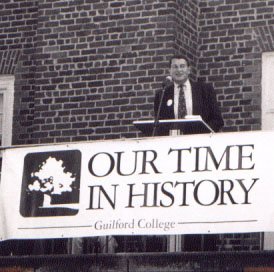To generate donations for the “Our Time in History” campaign, Guilford College President Don McNemar will spend much of his time away from campus for the next 17 months, meeting with alumni and friends of the college throughout the nation.
Jerry Godard, Academic Dean, will serve as a sort of interim president while McNemar is away, and will be responsible for the day-to-day operation of the college, making any necessary decisions as they arise. McNemar requested of the Board of Trustees that, for the duration of the campaign, Godard’s title be changed to Executive Vice President and Academic Dean.
Phil Manz, Chief Financial Officer, along with Bobby Wayne Clark, Special Assistant to the President and Vice-President for Public Affairs, will assist Godard in his new position.
The administration is particularly anxious, having received a prestigious Kresge Foundation challenge grant in late September, which promises Guilford College a $1 million donation only if it can raise $7,816,379 by Jan. 1, 2002. The pressure is high because it’s an all-or-nothing situation — if the mission is not accomplished, the college receives nil.
The “Our Time in History” campaign has raised $33.3 million since it began with the goal set at $50 million by 2002.
Charlie Patterson, Vice President for Institutional Advancement, has joined McNemar in his fundraising efforts, but that is nothing new for Patterson, whose office directs the campaign, controls the annual fund, and handles planned gifts. He described himself as the “traffic cop” of the campaign.
Before Thanksgiving, to begin this stretch run, McNemar traveled to New York, New Jersey, and Ohio, and then this past week to Atlanta. He sat down with some of the alumni, parents, and friends, and will do so with many of them for the next 13 months. He will talk to them about where the college is headed, tell them what its plans are, and then ask them to make a pledge over the next five years. Guilford College has approximately 14,000 living alumni, and a few thousand other supporters.
“It’s a lot of intensive one-on-one,” McNemar said. “People give to things that they believe in and are engaged with, and people believe tremendously in the Guilford education.”
Don McNemar does not step into this changed role without some remorse. “Personally, I’m a teacher, and I love to teach, and I’ve really enjoyed the on-campus engagement with students and faculty and staff. So I’ll miss that. There’s a twinge of regret that I won’t have as much engagement with students and folks on campus, but I’m excited about the prospects and I know how important it is to the future of the college.”
Patterson lauds McNemar’s exceptional aptitude for generating donations. “Don McNemar is a very good fundraiser,” he said. “He sits down in front of people and asks for a million dollars and doesn’t gulp. He does it in a very sincere way, a very professional way, in which he asks people to give to the college, and his sincerity really shows to a prospective donor.”
It is not out of the ordinary to send the president of a college out to do the fundraising. McNemar unabashedly admitted that prospective donors would prefer to talk to him, rather than to someone working for the office of Institutional Advancement or a member of the Board of Trustees.
“A lot of people want to talk to the president, they want to talk to professors that they’ve had, and they want to talk to people who are working in areas they are interested in,” said McNemar. “But usually at some point in the conversation they want to talk to the president.”
Patterson explained further. “As a development officer, this is (McNemar’s) normal presidential duty. He’s just giving a larger percentage of his time to it than he would have otherwise. This is the fifth college that I’ve been associated with. And it’s the fifth college where there has been a capital campaign going on. And in the other four, the president has devoted more time to this during a campaign. It’s just a part of the normal process.”
With the president gone for three full semesters, Guilford should be in capable hands. Jerry Godard has worked for the school for 33 years in a variety of positions, including a stint as executive dean, and many years as an endowed professor of psychology.
He verged on retirement last spring, but gave in to pleadings that he stay here as academic dean until May of 2001. Now he’ll be here for at least one more year.
“They say there’s no fool like an old fool,” Godard said. “And anybody who jumps into this kind of job rather than head out into the pasture has to be considered an old fool, but it’s worth doing.”
Godard knows he will have an increased workload, but fears nothing because it will be dispersed throughout the administration.
“One way of doing it is to create some kind of troika or internal council that will look after internal operations while the president is raising money,” he said. “Another is to have somebody for where the buck stops internally, and that was a model that was suggested, and I was suggested as the buck-stopper.
“Phil Manz and I will be in tandem and that means one in front of the other. And among mules, the best tandem pair is the one where you never know which mule you’re going to put up front.”
“Things will be done faster,” said Bobby Clark. “There’ll be more hands at it, more people involved. Too much has been on Don, too much for him to get done, and this spreads the work out. I expect two really big positives to come out of this. One is the greater attention to the campaign, and two, a more broad-based team to handle the day-to-day. It’s more effective this way in a campaign period.”

